
Important Things You Need to Know About Diesel Fuel Storage Tanks
Diesel fuel storage tanks are an important component of many industries, including agriculture, construction, and transportation. These tanks provide a safe and efficient way to store large quantities of fuel, which is essential for maintaining operations in a variety of settings. Whether you are using diesel fuel for backup power, heating, or any other purpose, there are a few important things you should know about diesel fuel storage tanks.
1. Types of Diesel Fuel Storage Tanks
When it comes to diesel-refueling storage tanks, there are various options available that encompass the tank itself, diesel pumps, and related accessories. Diesel tanks are commonly used for efficient fuel storage, while diesel pumps enable easy refueling. Accessories like fuel filters, nozzles, and hoses enhance the refueling process, ensuring safety and accuracy. Additional features may include fuel management systems for tracking usage and preventing theft. These comprehensive solutions offer a seamless and reliable diesel-refueling experience for various industries and applications.
2. Fuel Quality and Contamination
Diesel fuel quality is an important consideration for any operation that relies on diesel fuel storage tanks. Fuel quality can be affected by a variety of factors, including temperature, water content, and microbial growth. Contamination can also occur from outside sources, such as dirt, debris, or other chemicals.
Regular testing and treatment can help maintain fuel quality and prevent contamination. This can include measures such as filtering the fuel, adding biocides to prevent microbial growth, and testing for water content and other contaminants.
3. Safety Considerations
Safety should always be a top priority when working with diesel fuel storage tanks. Fuel tanks should be located in a safe and secure location, away from potential hazards such as fire or explosion risks. Proper ventilation and fire suppression equipment should also be in place to minimize the risk of accidents.
In addition to these safety measures, it is important to train personnel in proper handling and storage of diesel fuel. This can include measures such as using appropriate personal protective equipment (PPE), following proper fuel transfer procedures, and maintaining a clear and organized storage area.
4. Environmental Considerations
Diesel fuel storage tanks for generators can have a significant impact on the environment if not properly managed. Fuel leaks or spills can contaminate soil and water and can have negative effects on plant and animal life.
To minimize the environmental impact of diesel fuel storage tanks, it is important to comply with all relevant environmental regulations and to take steps to prevent spills and leaks. This can include measures such as installing secondary spill containment systems, conducting regular inspections and testing, and using spill prevention and response equipment.
Conclusion
Diesel fuel storage tanks are an important component of many industries, providing a safe and efficient way to store large quantities of fuel. To ensure the safe and efficient operation of diesel fuel storage tanks, it is important to follow proper installation and maintenance procedures, maintain fuel quality, prioritize safety considerations, and take steps to minimise environmental impact.
By following these important guidelines, operators can maintain a reliable and efficient fuel supply, minimize downtime, and reduce the risk of accidents and environmental damage. Shop diesel refuelling tanks, pumps and more here at Tank Management.







 Previous article
Previous article